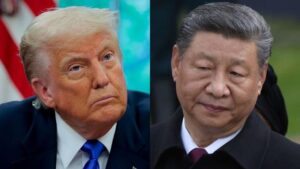Trump announces 30% tariff on imports from EU

In a move that has sent shockwaves through global trade corridors, U.S. President Donald Trump has announced a sweeping 30% tariff on all imports from the European Union, effective August 1, 2025. Framing it as a step to protect American jobs and industries, Trump cited long-standing trade imbalances and accused the EU of “taking advantage of the U.S. for decades.” The decision, which echoes the protectionist tone of his earlier presidency, is being seen by analysts as a strategic escalation that could provoke severe global economic consequences. With no product category spared—from German automobiles and Italian luxury goods to French wines and Danish pharmaceuticals—the tariff threatens to raise prices for U.S. consumers, ignite retaliatory measures from Brussels, and further destabilize already fragile supply chains. While Trump’s base views the move as a strong “America First” signal, critics argue it risks sparking a full-fledged trade war and isolating the U.S. from key allies at a time when global cooperation is more critical than ever. The EU has responded cautiously, preparing for diplomatic talks but leaving the door open for counter-tariffs. Internally, the bloc appears divided—Germany and France hint at sector-specific concessions, while others push for a tougher stance. As global markets brace for volatility, the looming question remains: Is this bold economic nationalism a tactical win for domestic politics, or the beginning of another era of trade fragmentation and global uncertainty?

America First… Again?
In a dramatic yet calculated move, former President Donald Trump—now seeking a comeback term—has announced a sweeping 30% tariff on all imports from the European Union, set to take effect from August 1, 2025. This decision signals a sharp escalation in his administration’s long-standing protectionist agenda, rekindling fears of a new global trade war.
The announcement, made during a campaign-style address in Michigan, echoes Trump’s 2018 trade policy, but this time with broader reach and bolder numbers. The blanket tariff affects everything from German cars and French wine to Italian luxury goods and Danish pharmaceuticals.
Why Now?
According to Trump, the EU has been taking advantage of the U.S. for “decades,” citing unfair trade balances and “ridiculous” regulations that hurt American manufacturers. His new tariff is being pitched as a way to “level the playing field” and revive domestic industry. However, critics see it as economic brinkmanship, one that risks isolating the U.S. from key allies and disrupting global supply chains.
Economists warn that such aggressive tariffs could:
Inflate consumer prices in the U.S.
Trigger retaliatory tariffs from the EU
Rattle financial markets already on edge
EU’s Response: Strategic or Sympathetic?
The European Union, while stunned, is reportedly preparing a measured but firm response. A formal letter detailing the tariffs is expected to reach Brussels soon. Germany and France are leading talks on whether to retaliate sectorally, or negotiate what’s being called a “mini-deal” to de-escalate tensions.
Behind closed doors, there are whispers of sectoral exemptions—especially for electric vehicles, pharmaceuticals, and aerospace tech—but EU officials remain divided on whether diplomacy or defiance is the right path.
Industry Impact: Winners and Losers
| Sector | Likely Impact |
|---|---|
| Automobiles | EU-made cars could see steep price hikes in the U.S. |
| Luxury Goods | French and Italian exports may lose market share. |
| Tech & Pharma | Could face delays, supply crunches, or countermeasures. |
| U.S. Retailers | Higher costs for imported goods = leaner margins. |
| U.S. Manufacturers | Some benefit from less competition—but at a cost. |
What’s Next?
If the EU retaliates—and history suggests it will—global markets may spiral into tit-for-tat tariff wars, dragging developing economies into the crossfire. With the WTO already weakened and international cooperation thin, Trump’s tariff gamble could reshape 21st-century trade diplomacy.
Yet, for Trump’s base, this plays well politically. It reaffirms his “America First” mantra, casts the EU as a trade villain, and appeals to domestic producers struggling under global competition.
Final Thoughts
While the 30% tariff might sound like a blow for European exporters, its rippling consequences could be far wider and longer-lasting. Whether this move proves to be strategic genius or self-inflicted damage will depend not just on the economics—but on how Brussels, Beijing, and Wall Street respond.
One thing is clear: global trade just entered a new—and uncertain—chapter.






